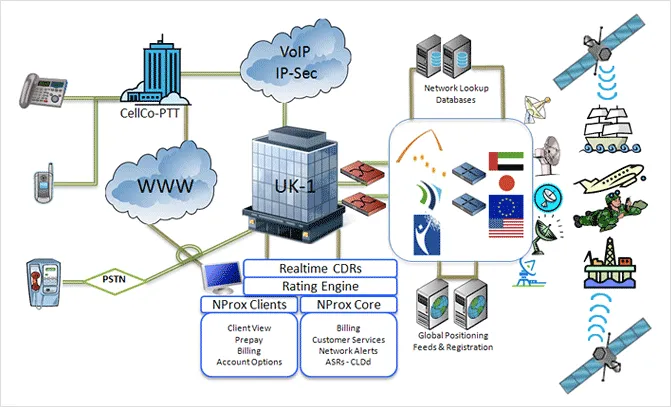A robust network is a must for any type of company in the twenty-first century because most products are digital or delivered digitally. The network may deliver its core business, or it may be as a support for employee collaboration. Also, it could be for automating various processes. Whatever may be the situation, fast and efficient IT infrastructure will improve productivity, and increase the ROI. In addition, a better network will help your company provide better services, improving customer satisfaction. However, technological advancements can make it challenging to choose, implement, and maintain all the services. We may not even have heard of several new technologies until we decide to secure our company.

Image Credit : marketsandmarkets.com – Network services
Moreover, we also have to manage the upfront cost and shoulder the responsibility of hiring and training the staff. This process also requires significant time. Network services may be the solution to these problems.
Contents
What are network services?
Network services refer to the third-party services we hire for transforming our networking infrastructure. Companies provide these services as a part of their global services for system integration. These companies have expert staff and the latest technological equipment. Their services may include fiber deployment, network designing, monitoring, securing, etc. The service providers usually have a pay-as-you-go model for network services. For example, they might have tiers where the lowest tier is the cheapest but only offers minimum services, and the top tier services, though cost more, have the premium services. Most services require periodic payments, but the services like fiber deployment and equipment installation may only have a one-time fee.
Benefits of network services
As mentioned above, network services eliminate the need for our involvement; we don’t have to spend our valuable time thinking about the right equipment or the method. Network services will shoulder all the responsibilities for us. We only need to make small regular payments. Even the scale of the services can be increased or decreased as required. If you were to implement the network yourselves, you would have to pay a significant amount of upfront capital. Upgrades and maintenance will also cost a lot. Here are a few benefits of network services.
No upfront cost
A significant factor that delays proper network implementation is the upfront cost. Upfront costs mean paying a particular amount before implementing the network. It is a restraining factor because of the inherent uncertainty of starting a business. This cost comes from having to invest in necessary tangible assets. For example, there is a need to buy equipment, hire employees, and train them. These processes will significantly reduce the capital. Doing so will reduce spending on valuable purchases directly impacting the core business. Hiring network services means you may only need to pay monthly fees far smaller than the required upfront cost.
Better cost prediction
A business needs to know its expenses with precision. Then only companies can plan their future investments. However, it is very challenging to predict the exact amount of network implementation, upgrading, etc., with an internal IT team. This is because there may be unforeseen costs due to defective equipment and operational errors. But the periodic fixed payments for network services can help predict the overall expense more accurately.
Better efficiency
Businesses need to implement services quickly. Otherwise, they lose the competitive edge. Other industrial players may seize considerable market share if they are too late. But that doesn’t mean quality is compromised. So the efficiency of implementation is one of the most important factors; efficient network implementations are quick, cost-effective, and don’t compromise quality. The reason is that the companies providing network services keep their staff well-trained and their equipment upgraded. They have the expertise and experience in many business verticals. Therefore, their processes will be more efficient.
Higher quality
Networking infrastructure should be reliable, which means there should not be any compromise on the quality of the implementation. Higher-quality networks would provide faster services, enabling the delivery of an enhanced user experience. Again because of the expertise and experience of the service providers, hiring network services will help gain a better quality network. These services keep their staff upskilled and reskilled and leverage advanced technologies. In addition, they might even have proprietary technologies that can deliver a competitive advantage over others.
Better security performance
Companies providing network services usually have a proactive approach. A proactive approach ensures the detection of threats of performance flaws before they affect our network. They can monitor the network for performance and threats; without your involvement, they will manage the flaws. Such an approach will reduce the downtime and may even eliminate it. Lesser downtime means more productivity, increasing your overall ROI.
Upgrades and maintenance
Networking infrastructure needs upgrades as new technologies arrive in the market and regularly need maintenance. Only then can we can ensure network availability. Moreover, it ensures reduced downtime.
Technical support
Network infrastructure depends on sensitive electronic equipment prone to failure. Therefore, it would help if there is a detailed maintenance schedule to ensure reliability.
The probability of a network flaw is significantly lower when you hire network services. However, in that unlikely event, you will get immediate assistance from the service provider’s experts. Due to their experience with many business domains, they already may have faced the situation. Therefore, they might have an immediate solution ready for implementation.
Conclusion
Network services are crucial to the success of businesses in making them more efficient and resilient. These services employ expert staff, use the latest technologies, and have experience serving in various business domains. Therefore, they are capable of performing more efficiently. They also eliminate the need to spend significant capital to buy equipment or recruit staff because it involves periodic payments. This makes predicting the cost easier, which is essential for deciding the company’s investments. Network services can also eliminate the responsibilities of managing, monitoring, and updating networks. You can also deploy fiber for your network much faster using the network services. In the information age, you need a fast and efficient networking service to have a competitive edge. With their well-trained employees and proprietary technologies, network services can serve companies efficiently, reducing costs and increasing returns.
FAQs
What are some examples of network services?
A few examples of network services are below:
- Fibre Rollout Services: End-to-end high-capacity fiber rollout for wired and wireless networks.
- Network O&M Services: These services include management of operations and Monitoring of networks.
- Data Center Network: Design and build future-proof data centers.
- Private Enterprise Network: These services can provide automation and security services for secure and critical networks.
- Network Design: Get high-quality designs from experts. These services will create a network that meets the requirements without going over the budget.
What do you mean by perimeter security?
Perimeter security services include creating an intrusion-proof network infrastructure by using various monitoring services. These include CCTV, motion sensing, biometric access, etc. Perimeter security is essential for defense; however, all businesses must safeguard their network premises. If a person with malicious intent gains access to the physical infrastructure, they can do more harm. For example, hackers can gain access to an isolated secure network not connected to the internet. Other areas where perimeter security is critical include airports, cell towers, and gas lines.
What are Private LTE networks?
Private LTE networks refer to local cellular networks using 4G and 5G technologies. 5G private networks will be more popular than 4G as the 5G small cells are easier to install. These enable industries to manage huge amounts of data, analyze it, and derive meaningful results without experiencing any hiccups. These networks are closed, and anyone cannot access them, unlike public LTE networks. By subscribing to their services, you can access a public LTE network like BSNL. Public LTE networks aim to make money. However, private LTE networks only aim to benefit the company.
What do you mean by system integration services?
System integration services refer to end-to-end design, build, and management services to transform companies by making them more efficient and resilient. These services offer high scalability, meaning they can handle the company’s growth. You don’t have to worry about future-proofing. System integration services will take care of that. Moreover, system integration services offer multi-layer performance, operational redundancy, and application-level intelligence. A system integrator will have experience in several domains, and they will keep their organizational skills and technology up-to-date. Therefore, they are more cost-efficient than an in-house IT team, where you have to manage upskilling and reskilling of employees.















